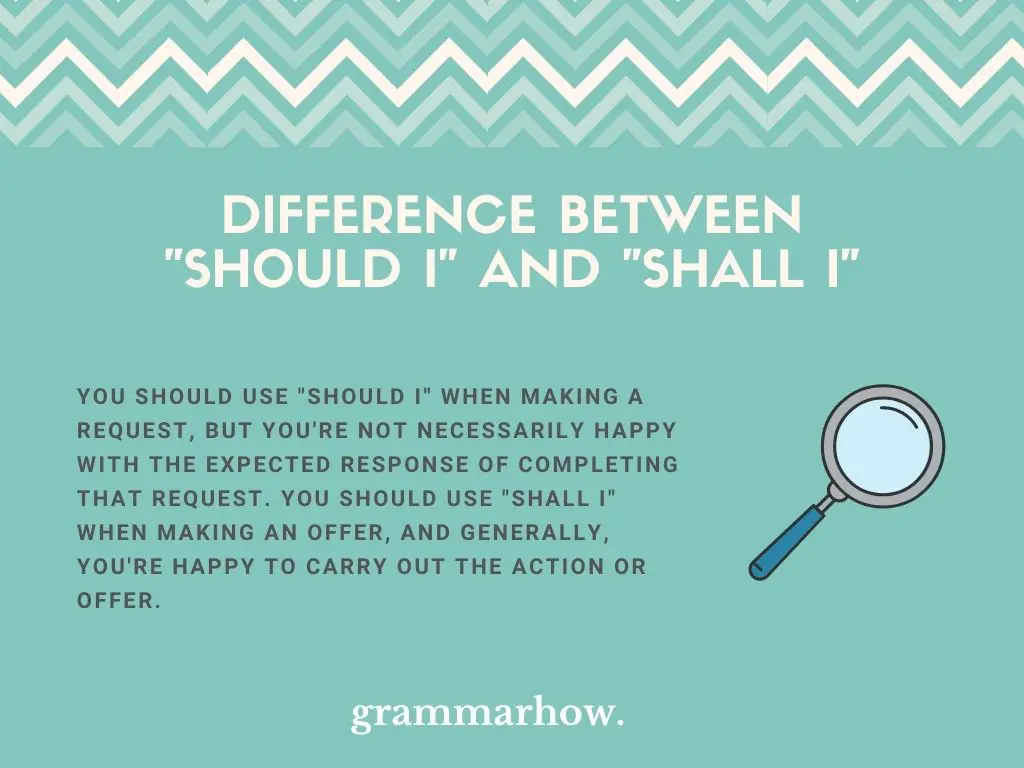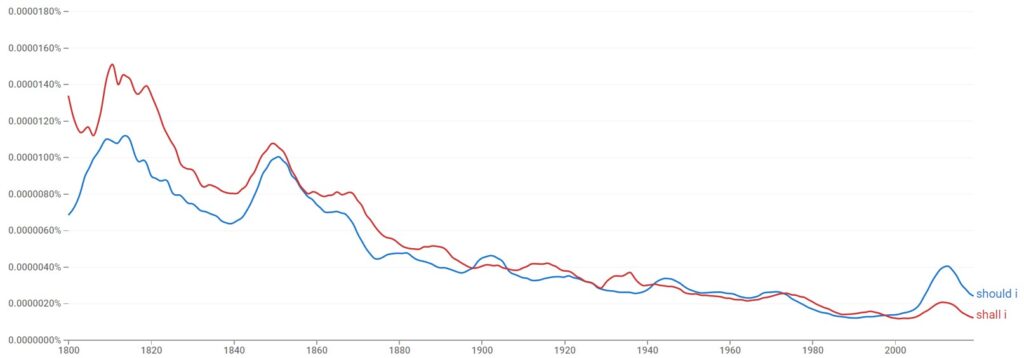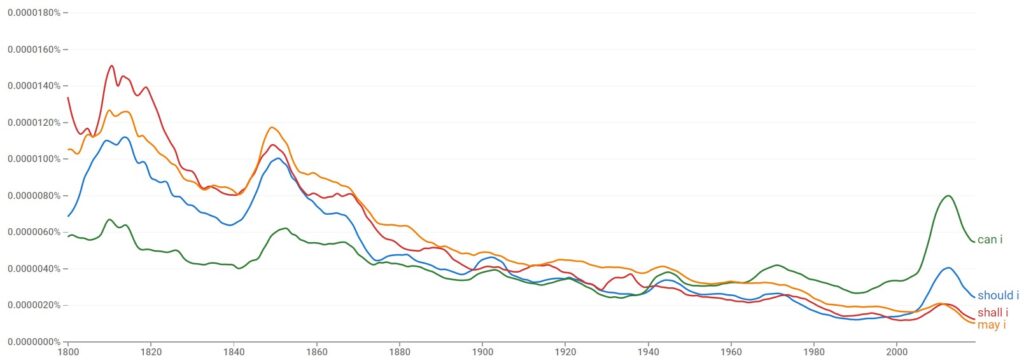“Shall I” and “should I” are fairly similar in English. We can use them somewhat interchangeably, but it’s important to know the subtle differences between the two. This article will look at how to use them and provide examples to help you understand them better.
What Is The Difference Between “Should I” And “Shall I”?
You should use “should I” when making a request, but you’re not necessarily happy with the expected response of completing that request. You should use “shall I” when making an offer, and generally, you’re happy to carry out the action or offer.

The definition of “shall,” according to The Cambridge Dictionary, is “used, with “I” or “we,” to make a suggestion.”
The definition of “should,” according to The Cambridge Dictionary, is “used to say or ask what is the correct or best thing to do.”
Both phrases are interchangeable. We can use “shall” or “should” no matter whether we’re making an offer or request. However, there are a few subtle differences that some native speakers might pick up on.
“Shall I” is an offer. We use it to ask whether we should complete something, often already accepting that we should do it. When someone says “yes,” we expect it, and we’re happy to do whatever it is that we offer.
“Should I” is an offer. Generally, we’re hoping that the answer won’t be “yes,” as we’re not as keen on completing the request, even if it’s the more obvious course of action for the given situation.
Is “Should I” Or “Shall I” Used The Most?
The phrases are very similar, and we can use them interchangeably if we need to. Most native speakers won’t mind whichever form you use. However, we can go further and look at some statistics of them both so that you can see which is more popular.
According to this graph, “should I” is more popular, but only slightly. Both phrases are used, though they are both much less popular than they were two centuries ago.

“Should” and “shall” are polite and formal options in English. For that reason, many native speakers today stay away from using them because they feel archaic and outdated.
Generally, we’d use something like “can I” or “do I,” as both of those verbs are easier to read and write, and everyone understands what the meanings are without much overlap.
Examples Of How To Use “Should I” In A Sentence
Let’s look at using “should I” in a few sentences. As we’ve mentioned, it is synonymous with “shall I,” but the implication is that we’re not keen on completing whatever the request is that we’re making.
“Should I” makes a request, and often we’re not happy about completing that request for one reason or another.
- Should I do something to help him?
- Should I make your life easier by calling them for you?
- Should I say something, or do you think he’ll get over it?
- Should I make him a cup of tea when he arrives?
- Should I bite my tongue, even when they insult my family?
- Should I tell him that he has to leave?
- Should I stop him from doing that again?
- Should I leave him here or take him with me?
- Should I visit my mother in the hospital later today?
- Should I go with her to see his ashes?
As you can see, “should I” asks a question that we’re often not fond of asking. Whether it’s something we don’t want to do or something that we need to clarify before doing it, “should I” is a request that we’re not entirely sure how to sort out or complete.
Usually, we’d expect someone to say “yes” or “no” when we ask a question with “should I.” Typically, we’re hoping for the negative “no,” so that we don’t have to do whatever the undesirable task is.
However, we often hear “yes” and have to carry out the task more often than not. Often, we’ll understand that the answer is “yes,” even though we don’t want to believe it ourselves.
Examples Of How To Use “Shall I” In A Sentence
“Shall I” is synonymous with “should I,” but there are a few differences in how we might write it.
“Shall I” is an offer. We already accept that we’ll have to carry out the task, and we often don’t mind doing so.
- Shall I help you with your bags, dear?
- Shall I call the police, or are you going to stop?
- Shall I catch up with you later today?
- Shall I do anything to stop this mayhem?
- Shall I carry your items out for you?
- Shall I reward him for his fine work?
- Shall I make myself at home in your place of work?
- Shall I stop by when I’m around later?
- Shall I see whether they’ve got candy in the cupboards?
- Shall I pay you now or later?
“Shall I” is an offer we make, even though we already expect the answer to be “yes.” It always asks a question since “shall” comes before the pronoun.” When we ask this question, we’re hoping for a “yes,” and we’re already leaning towards the positive side of it.
Sometimes, you might be a question of “shall I” with “no.” While it’s rare, it’s best if you take it in your stride and move on rather than pressuring the answerer to figure out why they declined your offer.
Are “Can I” And “May I” Interchangeable With “Should I” Or “Shall I”?
Generally, the verb that comes before the pronoun isn’t what’s most important here. What’s most important is whether they’re interchangeable and have the same meaning.
According to this graph, “can I” is the most popular verb to use to make a request or offer of some kind. “May I” is also used, but it’s about as popular as “shall I.”

“Can I” is interchangeable with “should I” and “shall I.” It works well to make a request or an offer, depending on whether or not you want to complete the task you’re offering. “May I” is more polite than the other three, but it only makes a request and is synonymous with “should I.”
- Can I offer you help with your bags?
- Can I see whether he’s okay with this?
- Can I do anything to help?
- May I offer you some assistance?
- May I help in any way?
- May I kindly ask you to move along?
Neither of the phrases is identical to what “should I” or “shall I” offer, but we can use them interchangeably in certain scenarios. It mostly depends on the kind of request you’re making.
For example:
- Shall I call the police?
- Can I call the police?
- May I call the police?
Here, “shall” is the most appropriate, and “can” and “may” don’t work very well (unless you’re specifically asking for permission to do so).
- Shall I help you?
- Can I help you?
- May I help you?
For these examples, all of the verbs are synonymous. You can use whichever one you want to offer your help to somebody.
Can “Do I” Be Used Interchangeable With “Should I”?
“Do I” and “should I” are not interchangeable. “Should I” is making a request as to whether we should do something. “Do I” is asking for validation of whether something is the correct thing to do.
Typically, “should I” is used even when we know what we’re supposed to do. If we’re not happy with doing the thing we’re asking, we might use “should I” in the hope that someone might say “no” and prevent us from doing it.
- Should I call the police?
- Should I really be here?
However, “do I” is asking for validation. We’re unsure about the outcome of our actions, and we want someone to help us understand whether it’s smart to do the thing we’re asking for before we do it.
- Do I have to help?
- Do I call the police now?
Is It “When Should I Come” Or “When Shall I Come”?
We use “when should I come” when we’re asking for a time to meet with an event that’s already confirmed. We’re trying to narrow down the time frame that we might already have. We use “when shall I come” when we haven’t been given a time frame yet.
For example, if a party is set for seven p.m. and you know this, you might ask the host:
- When should I come tonight?
- Maybe eight o’clock?
We’re asking for the time again, even though we already know it. This works well for parties because no one tends to arrive on time.
With “shall,” we might not have heard the time already, so we’re simply asking for the time:
- When shall I come?
- Anytime now works well!
How do you use “Shall I say”?
You use “shall I say” when you’re making an offer to say something for somebody else. “Shall” is used to offer a service or action to somebody, and it’s up to them whether they want to agree to you doing that action (in this case, “saying” something).
- Shall I say the thing that you wanted to say?

Martin holds a Master’s degree in Finance and International Business. He has six years of experience in professional communication with clients, executives, and colleagues. Furthermore, he has teaching experience from Aarhus University. Martin has been featured as an expert in communication and teaching on Forbes and Shopify. Read more about Martin here.
